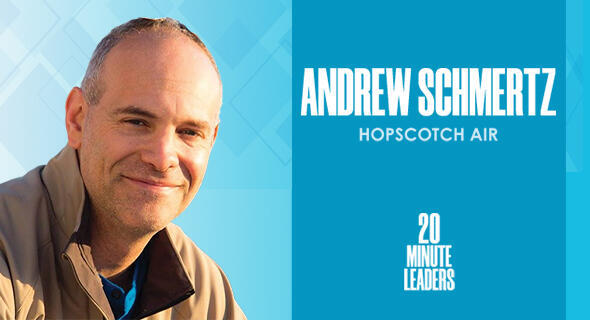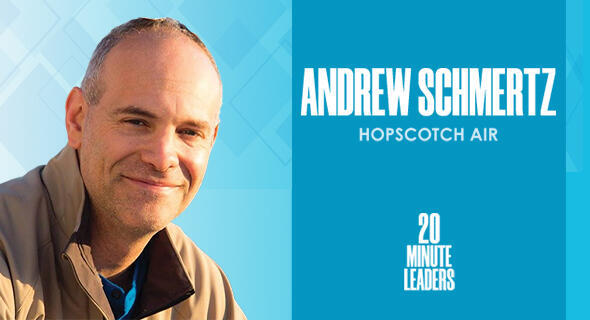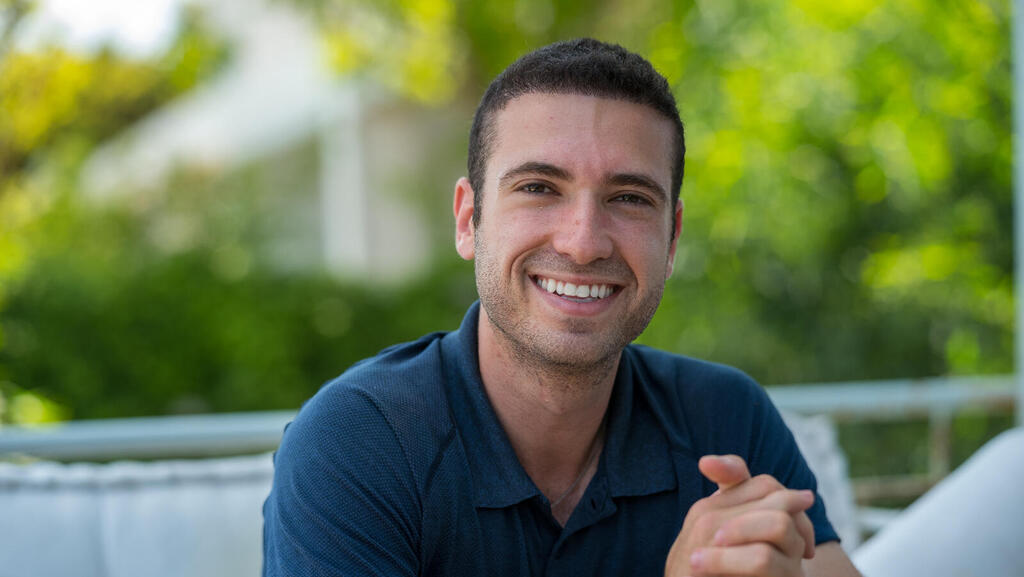
20-Minute Leaders
Could air taxis be the next big thing?
Michael Matias spoke with Andrew Schmertz, the CEO of Hopscotch Air, about the growing public curiosity for the private aviation industry
If Andrew Schmertz looks familiar to you, it's not by chance, a little more than a decade ago, he was a TV reporter in New York and a lawyer until this private pilot joined his friends from college to establish an airline, but on their own terms- " we looked at the environment, we looked at the aviation space in that environment and decided that this category is one that we could enter and we can grow and we could eventually dominate" says Schmertz. Since then, this CEO has built an air taxi company from scratch using several methods that have made them a leader in the field.
"We certified the airline from the ground up. We worked diligently with the FAA. That's unusual. Many companies buy an air certificate or many companies broker out flights but don't actually operate the aircraft. We operate the aircraft and it's a branded operation. Every one of our planes has our name on it; all the pilots wear Hopscotch Air shirts, and that's unusual in the on-demand private aviation space".
I love it. Tell me a little bit about private flying and air taxi operations. Is this a new phenomenon or is this a growing phenomenon?
"It's kind of a split phenomenon. You could always show up at the airport and find somebody to fly you somewhere. So, there's always been a private aviation component, especially here in the United States. I know that in Tel Aviv, Israel, private aviation is also growing. And it's growing throughout Africa, by the way, by leaps and bounds".
When a high percentage of the people who can afford to fly privately do not fly for one reason or another, Schmertz understood that it was a matter of perceptual change among customers regarding the benefits of the service. "What we've done is we were looking at a market of how to expand the number of people who could fly on a private aircraft. Because as you know, a small percentage of the population that can afford to fly privately ever does. And what we developed is a regional on-demand air taxi service. We never used the word 'charter'- we are technically a charter company by regulation, but we never used the word charter, because charter suggests that Kim Kardashian is going to get on the plane and you are going to have champagne and caviar. None of that. We provide a utilitarian service and we do that by flying small Piston aircraft, Cirrus aircraft, four-seater aircraft, that plane with the parachute, you may have seen it. And we fly on regional routes, largely in New York. We serve a customer base that's both leisure customers and business customers, so let's say you will need to fly to Ithaca, that's about an hour and 10-minute flight from New York, and come back for your son's soccer game at night - you can do that with Hopscotch Air. And you could do that at a price point that is about two-thirds less than traditional charter flying- so we are really competing against the car, because you could drive everywhere we fly to, and we are competing against the regional airlines, which in the United States, the regional airlines have largely collapsed over the past couple of years.
So how do you actually operate as a business?
"We made some strategic decisions early on. We were going to be a branded operation, which means that all of our customers are our customers. We are not relying on the brokers to give us the flight. So about 95% of our customers are organic. They are homegrown by us. We are also heavily marketed. We believe in marketing aggressively, and with a sales force that is different than the traditional charter company, so we really believe we are running an airline.
We also made a decision that to attract new customers to this space, you had to look and feel and talk to the customers like you are an airline: booking had to be similar; the process had to be simple; you had to give a price that wasn't variable on how long the flight is going to take, it's just a fixed price. That was new to the business. Now, everybody's doing that. But that was very new to the business when we launched. So, we want to look and feel like an airline, but we are not giving you the airline experience because you get to choose the time you want to go, and where you want to go. And there are no long lines at the airport to get out on the plane".
I want to defer on this point for a second because it's a really interesting one. I would assume that part of the magic of going through a service like Hopscotch Air Is the fact that you don't have the traditional airline experience of booking. What were the key understandings from a consumer behavior standpoint that made it clear to you that this is how the framing and the messaging should be?
"It's the ease of use. So, if you want to charter an aircraft in the United States, it's not an easy process: You probably need your executive assistant to pick up the phone and call multiple brokers, get a number of quotes in, and then you kind of decide which one you want. That was not the system we were aiming for. We were talking not just to the executive assistant but we are talking to the actual passengers who are flying on our planes, and they want the ease of the system. They want to know if you are available and 'how much it's going to cost me?'- And those two answers derive whether people will book. And of course, they ask safety questions too, which we can very easily answer. So, the customer typically wants to know those three components, but by the time they get to the safety question, and you know, most customers who fly for the first time ask questions about the pilot, about the plane, what's your safety protocols- by the time they get to that question, we know they will book. We want to reduce the friction in the business. There's too much friction in private aviation right now".
What's the vision here of Hopscotch Air?
"So, the vision has always been, and it got curtailed during Covid, certainly, we believe that we can put a hundred of these aircraft in the northeast alone, and in the summer, fly them every day. We also believe it's a nationwide product. That it can work in any market in the United States, even in areas like North Dakota where the weather is poor, So the goal and the vision of the company really is not just to provide equal alternative, but to provide a new option for people in their flight, in their travel profile".
So, if you are taking this one step further and you are thinking about the way that this impacts customers, are you imagining this is becoming a more mainstream event, is this staying with a specific demographic?
"Our experience is that the regional travel business needs to be solved in the United States. So there's no good train service in this country, There's Amtrak that will take you to New York, to Boston- but if you are traveling anywhere else from New York to Boston or New York to Washington, the train services are spotty. The roads, the infrastructure is a disaster, so there's all this effort to fix the roads. So, the real solution is air travel. And that's why you are seeing a number of companies with these eVTOLs - Electric VTOLs. But I don't personally believe the battery power is going to be there for a decade or so, so you need solutions to take people off the road, that is where the real environmental impact is happening in this country. Is that there are too many cars on the road and stuck in traffic and polluting all the air. That pollution can be resolved through travel, through air travel".
The show (20 Minute Leaders), in the end, it's all about leadership and why you do what you do. Why do you do what you do?
"It's a very good question because there are a lot of easier ways to make money. I'll tell you that: There is the dedication and the drive to build a business. Because of my connection to aviation, this is a space that interests me. When we talk to shareholders and when we talk to potential investors, we say that this is a market that can grow and can be profitable. It is not going to be a tech company though, because you can't scale it like a tech company. You need airplanes and you need pilots, and there's a shortage of both right now, and so we need to resolve those issues.
I also enjoy the challenge. So, the challenge is really kind of what gets me up in the morning. I like problems, and there are problems every day. You kind of wake up and it's a jigsaw puzzle and all the pieces are spread out all over the floor. Every morning you put the thing together piece by piece by piece, and then at night your dog wrecks the whole thing and you have to start all over again. I enjoy that. And even though you are tired of doing that and you need to hire and work with great people who can support you, I enjoy that process".
When asked how he manages to lead his company employees who are used to being in a leading position by their very role as pilots, when the statistics are that about 70% of the errors in the field of aviation are due to human error, Schmertz refers to the way he deals with the "know-it-all" mentality that prevails in aviation professions - "You proved to them that you are smarter than they are. It is a challenge. Pilots are certainly a little bit cocky. They are highly trained professionals. They are excellent at their jobs. But I also know pilots who are excellent stick and rudder pilots and you can trust them with your family, but they can't tie their shoelaces outside of the airplane. You lead by providing a good culture, a culture of respect. I say to every pilot who comes into the organization 'Let me know what else you want to do in this business because there's a number of other things, so if you don't want to be a pilot at the end of the day, maybe you can do a different job'. We want to have and show respect to all members of the Hopscotch Air team, and it is about building a culture that is sustainable. And that's where the airlines failed over the last decade and a half or so. Their culture was 'We are going to pay you and you are going to show up and do a job, and when fuel prices go up, we are going to fire you'- That was the culture. There was very little investment in the pilots. And they are paying the price for that now because pilots stopped being pilots, right? And they stopped minting new pilots. And that is true with any business, you need to establish a good culture. Where there's respect, where there's understanding, where you pay well. And we pay pretty well for our side as a company and our side as aircraft, but we can't compete with Delta Airlines, of course. So, we expect pilots to stay 18 months and then move on. That's fine. Because we want them happy because they will refer their friends who are coming up in the ranks to our company. And building the culture is essential. It's also essential from a safety standpoint. You need to have a culture of safety, so you have to empower a pilot to never be afraid to cancel a flight".
Michael Matias, Forbes 30 Under 30, is a Venture Fellow at Innovation Endeavors as well as investment Venture Partner at Secret Chord and J-Ventures. He studies Artificial Intelligence and Human-Computer Interaction at Stanford University, and was an engineer at Hippo Insurance. Matias previously served as an officer in the 8200 unit. 20MinuteLeaders is a tech entrepreneurship interview series featuring one-on-one interviews with fascinating founders, innovators and thought leaders sharing their journeys and experiences.
Contributing editors: Michael Matias, Betty Elbert.














